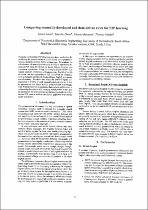JavaScript is disabled for your browser. Some features of this site may not work without it.
- ResearchSpace
- →
- Research Publications/Outputs
- →
- Conference Publications
- →
- View Item
| dc.contributor.author |
Loots, L

|
|
| dc.contributor.author |
Davel, M

|
|
| dc.contributor.author |
Barnard, E

|
|
| dc.contributor.author |
Niesler, T

|
|
| dc.date.accessioned | 2010-01-08T06:38:33Z | |
| dc.date.available | 2010-01-08T06:38:33Z | |
| dc.date.issued | 2009-11 | |
| dc.identifier.citation | Loots, L, Davel, M et al. 2009. Comparing manually-developed and data-driven rules for P2P learning. 20th Annual Symposium of the Pattern Recognition Association of South Africa (PRASA). Stellenbosch, South Africa, 30 November - 01 December 2009, pp 35-40 | en |
| dc.identifier.uri | http://hdl.handle.net/10204/3851 | |
| dc.description | 20th Annual Symposium of the Pattern Recognition Association of South Africa (PRASA). Stellenbosch, South Africa, 30 November - 01 December 2009 | en |
| dc.description.abstract | Phoneme-to-phoneme (P2P) learning provides a mechanism for predicting the pronunciation of a word based on its pronunciation in a different accent, dialect or language. The authors evaluate the effectiveness of manually-developed as well as automatically derived P2P rules for British to South African English pronunciation conversion. Using the freely-available Oxford Advanced Learners Dictionary of Contemporary English (OALD) as source, the two approaches to P2P conversion are compared to a manually-developed South African English pronunciation dictionary. The authors show that, when the British English pronunciation is known, a small manually-derived rule set is able to approximate the South African pronunciation surprisingly well. Furthermore they demonstrate that the best performance is achieved by data-driven P2P learning, which proves to be a better mechanism for pronunciation prediction than both manually-derived P2P rules as well as data-driven grapheme-to-phoneme (G2P) conversion. | en |
| dc.language.iso | en | en |
| dc.publisher | PRASA 2009 | en |
| dc.subject | Phoneme-to-phoneme learning | en |
| dc.subject | P2P | en |
| dc.subject | Pronunciation prediction | en |
| dc.subject | Pronunciation conversion | en |
| dc.subject | Grapheme-to-phoneme | en |
| dc.subject | G2P | en |
| dc.subject | PRASA 2009 | en |
| dc.title | Comparing manually-developed and data-driven rules for P2P learning | en |
| dc.type | Conference Presentation | en |
| dc.identifier.apacitation | Loots, L., Davel, M., Barnard, E., & Niesler, T. (2009). Comparing manually-developed and data-driven rules for P2P learning. PRASA 2009. http://hdl.handle.net/10204/3851 | en_ZA |
| dc.identifier.chicagocitation | Loots, L, M Davel, E Barnard, and T Niesler. "Comparing manually-developed and data-driven rules for P2P learning." (2009): http://hdl.handle.net/10204/3851 | en_ZA |
| dc.identifier.vancouvercitation | Loots L, Davel M, Barnard E, Niesler T, Comparing manually-developed and data-driven rules for P2P learning; PRASA 2009; 2009. http://hdl.handle.net/10204/3851 . | en_ZA |
| dc.identifier.ris | TY - Conference Presentation AU - Loots, L AU - Davel, M AU - Barnard, E AU - Niesler, T AB - Phoneme-to-phoneme (P2P) learning provides a mechanism for predicting the pronunciation of a word based on its pronunciation in a different accent, dialect or language. The authors evaluate the effectiveness of manually-developed as well as automatically derived P2P rules for British to South African English pronunciation conversion. Using the freely-available Oxford Advanced Learners Dictionary of Contemporary English (OALD) as source, the two approaches to P2P conversion are compared to a manually-developed South African English pronunciation dictionary. The authors show that, when the British English pronunciation is known, a small manually-derived rule set is able to approximate the South African pronunciation surprisingly well. Furthermore they demonstrate that the best performance is achieved by data-driven P2P learning, which proves to be a better mechanism for pronunciation prediction than both manually-derived P2P rules as well as data-driven grapheme-to-phoneme (G2P) conversion. DA - 2009-11 DB - ResearchSpace DP - CSIR KW - Phoneme-to-phoneme learning KW - P2P KW - Pronunciation prediction KW - Pronunciation conversion KW - Grapheme-to-phoneme KW - G2P KW - PRASA 2009 LK - https://researchspace.csir.co.za PY - 2009 T1 - Comparing manually-developed and data-driven rules for P2P learning TI - Comparing manually-developed and data-driven rules for P2P learning UR - http://hdl.handle.net/10204/3851 ER - | en_ZA |






